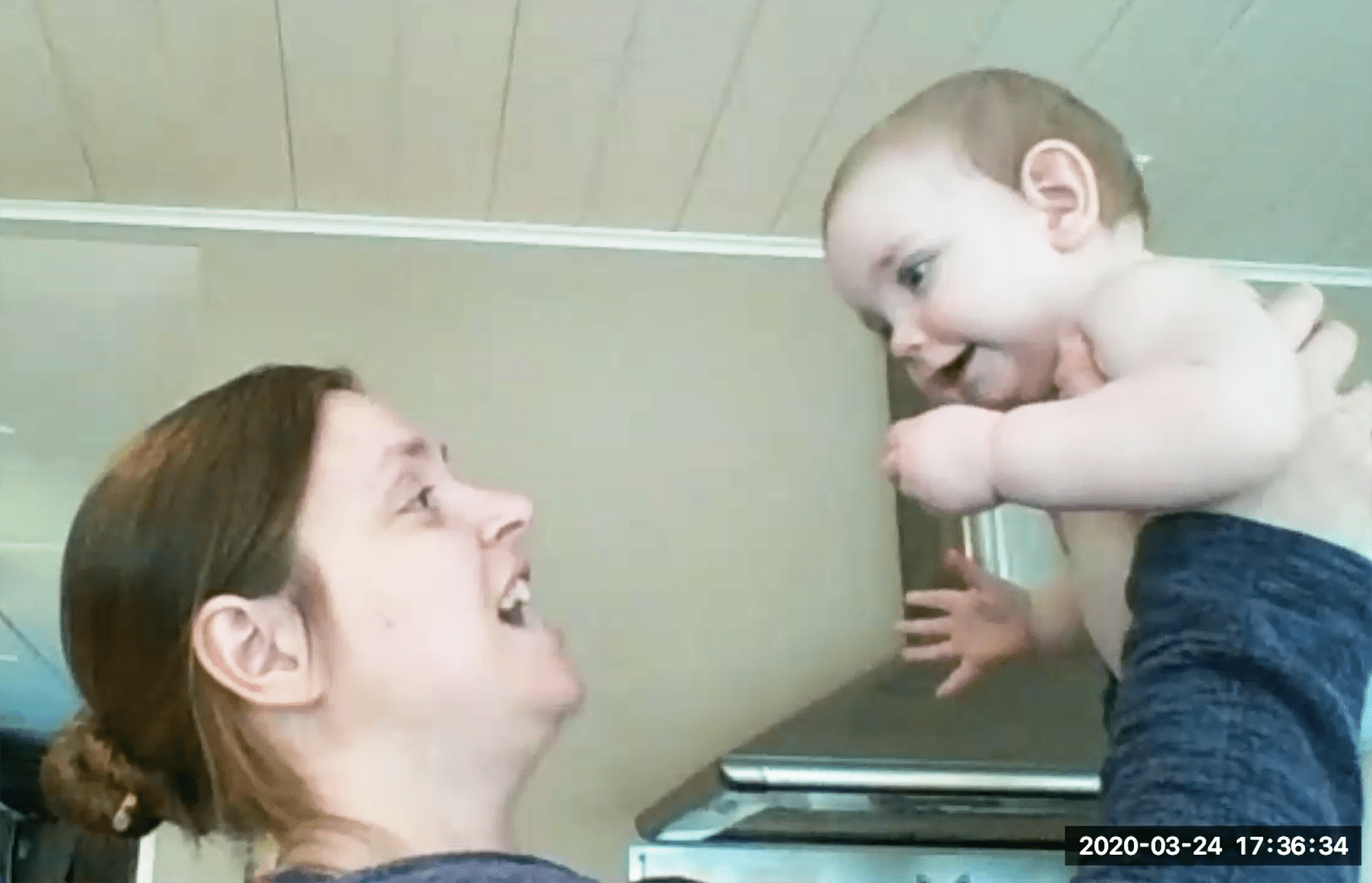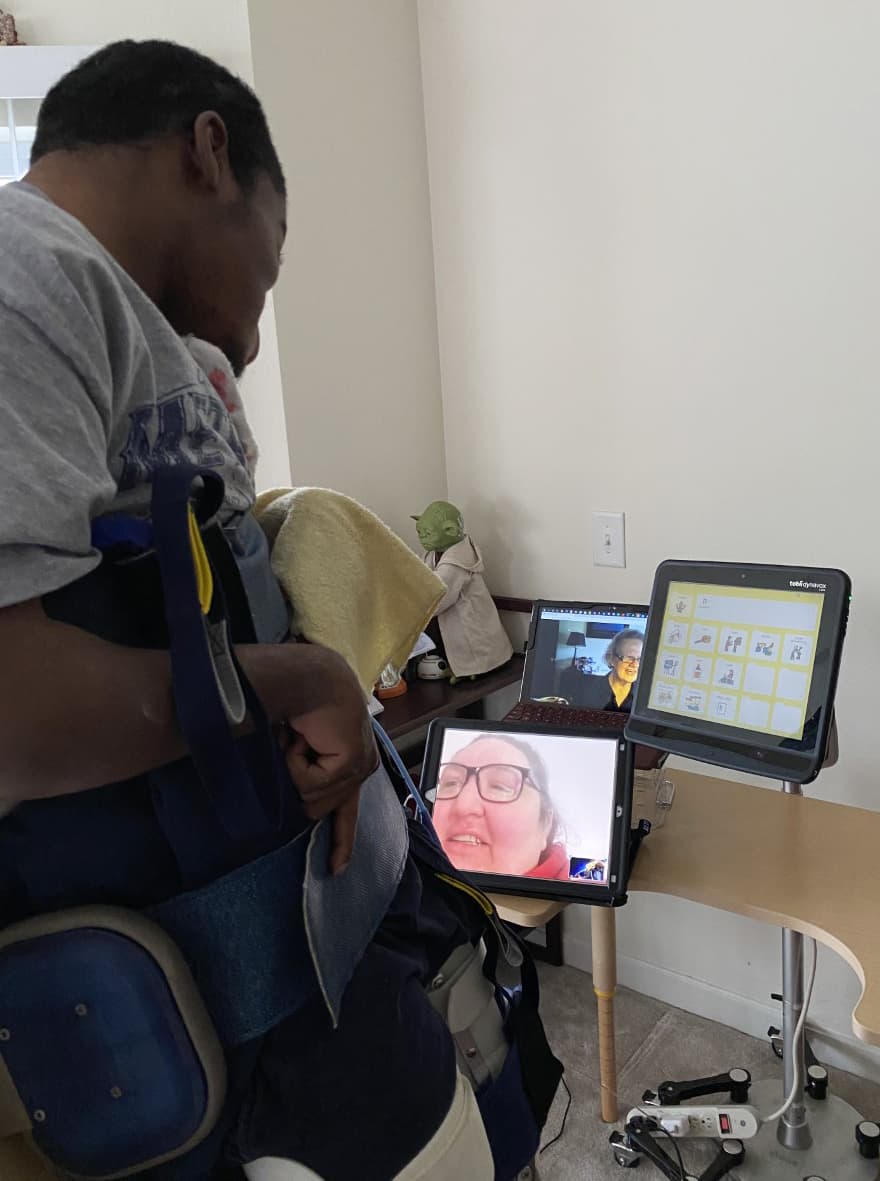Advertisement
'When He’s At Home, He Has Me': Students With Disabilities And Their Families Cope With Prolonged School Closures
ResumeAcross Massachusetts, thousands of parents and guardians are working long hours — often with little help — to protect, advocate and care for children with disabilities during the coronavirus crisis.
With the state’s public schools now closed for at least another month, the disruption is creating a new strain on busy caregivers, too.
"There’s days when I’m like, ‘I can’t do this anymore," said Jean Johnson of South Boston, who cares for a 13-year-old grandson coping with post-traumatic stress. "I say a lot of prayers."
State data show that during the 2018-19 school year, there were around 83,000 students on individualized education programs for various disabilities in the state’s public schools — comprising about 18% of the overall enrollment.
That single category belies the extraordinary diversity of those students and of their particular needs: ranging from dyslexia and ADHD to the most acute medical complexities. But all of those students have something in common: they were granted at least some accommodations — from hours of one-on-one support to tailored teaching practices — that districts are now working to implement remotely.
“When he’s at school he has a 1:1 aide, he has a physical therapist. He has all of these people. When he’s at home, he has: me," laughed Elizabeth Bostic of Methuen. Bostic is the devoted single mother of 20-year-old James, who — due to a severe case of jaundice in infancy — is non-verbal, hearing-impaired and uses a wheelchair.
At 5'7" and 120 pounds, James is not a "little guy," Bostic said. So to help him with everything from toileting and grooming to communication, she relies on either his school — the CREST Collaborative in her hometown — or two personal-care assistants who work in their home.
"You need a lot of equipment ... and ideally another body," she said. "Otherwise it can be physically exhausting.”
But Bostic has learned that one of those assistants won't be able to come for the duration of the outbreak.
Using his assistive device, James can be funny and chatty, and so imperious she calls him "King James." That makes this indefinite physical estrangement from his school community particularly difficult.
"To be basically locked down, and not see anyone but me — it's very limiting for him," she said.
Sophia Johansson of Manchester-By-The-Sea told a similar story about her 10-year-old son, who has a diagnosis of autism spectrum disorder.
Many students with disabilities have experience with being kept out of school for medical or behavioral reasons. In the Johansson's case, her son's occasional bouts of dysregulation — what can look like intense waves of fear or aggression — have led to hospitalizations in the past.
That makes this closure harder to explain. For the past few weeks, Johansson said, her son "was concerned that he’d be going to the hospital again. … He’s like, ‘What did I do wrong? Who's mad at me?’” She and her husband have made efforts to reassure him that this closure has nothing to do with him.
Johansson declined to provide her son's names to protect his privacy.

Neighbors were able to loan Johansson's husband some space for work during the day. But that means Johansson is in their 1,000-square-foot condominium alone with three children. Her son can be bothered by the vocal cooing of her nine-month-old daughter, Hazel.
"I really am coming to understand that every person in our house needs at least 500 square feet to themselves," Johansson said.
This kind of parenting can tax caregivers emotionally, whether or not there's a public-health crisis going on. For Bostic, it's the feeling that she could always be doing more.
"Sometimes you're so busy doing that, you don't have time to process those emotions," she said. "It's only when it gets really, really quiet that that all crashes in."
Both Bostic and Johansson noted that they're lucky that their children attend schools that specialize in serving students with complex disabilities. And both women said that, for the most part, those schools impressed them with their prompt and sensitive responses to the closure in March.
Teachers scheduled online hangouts and frequent video classes. Johansson has set up her son's calendar so that he can join in on his own. Otherwise, she said, she's given her son and her five-year-old daughter lots of free time for imaginative play — what she half-jokingly calls the “full feral" approach.
And when Bostic noted that the video courses weren't accompanied with sign-language interpretation so that James could follow along, staff at the CREST Collaborative promised to adjust. By now, she has set her son up with a kind of mobile command center — comprised of a laptop, an iPad and his assistive device.
Bostic said she feels "blessed" to have cooperative staff at school, spiritual and emotional support from her church community. And she's "incredibly grateful" for the one remaining care assistant during the week, "Because I know there are other families who don’t even have that.”

As an education attorney for Greater Boston Legal Services, Elizabeth McIntyre represents some of those families.
Many of her clients are still struggling to answer the "basic questions" — rent and food, work hours and safety — which leaves them little time for the delicate work of making sure kids with disabilities keep making progress.
“I was just talking to a parent this morning who said, ‘Elizabeth, I’m not a special education teacher. My child is supposed to get this rules-based reading program ... and I don’t know how it works!’” she recalled.
McIntyre cheered the news last week that state officials reversed an earlier position and gave "very clear guidance": that students with disabilities are still entitled to educational services during the pandemic. But so far, the rollout has been imperfect.
In South Boston, Jean Johnson said her grandson's therapy appointments haven’t been going well over the phone — despite the therapists' best efforts.
“By the third question, he’s like, ‘I’m not talking to them,’" she said. "And he walks away, or tries to hang up.”
Last week, Johnson requested one of the laptops being distributed by Boston Public Schools to allow for at-home learning and videoconferencing, but said she hadn’t heard back yet. District officials said they’ve reached out to everyone who requested a computer at the available contact information.
So for now, while she awaits more institutional help, Johnson is cooking up curriculum of her own: her grandson "gets to measure all the stuff for the cookies — things like that."
Raising a child with a disability tends to involve accidental experience in advocacy — lobbying to get tests done and to get an individual education program developed and implemented — that can become a vocation. For 15 years, Bostic's full-time work has been as an advocate for families like hers, and Johansson trains families to know their rights as a co-chair of Mass. Families Organizing for Change.
Bostic notes that Massachusetts has a history of protecting the rights of students like James to an adequate education. Even in crisis, she said, "we don’t want to lower our standards."
But like nearly all of the parents who spoke to WBUR for this story, Bostic was herself prepared to be accommodating. School districts have their work cut out for them in the weeks ahead as they try to implement complex learning protocols and other supports outside of schools' shared physical space.
"Given that this is our new reality, for we don’t know how long," Bostic said, "the biggest challenge will be making sure that whatever solution we come up with is truly equitable for all students. We are poised to do some really meaningful problem-solving."
This segment aired on April 2, 2020.
